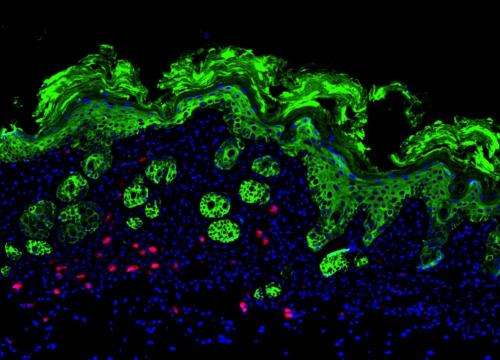Itching for new help for eczema: Recently identified immune cells possible therapeutic target

Researchers have identified a previously unknown critical role for a recently identified immune cell population in the progression of atopic dermatitis. The team found an accumulation of innate lymphoid cells in the active lesions of patients with atopic dermatitis, and in mice, they showed that ILCs contribute to disease progression. These studies suggest innate lymphoid cells may be a new therapeutic target in treating the development and severity of atopic dermatitis.
The increasing incidence of allergic skin diseases, and the accompanying economic burden and heightened risk of developing other allergic conditions, have spurred researchers to look for better ways to control these immune system-based disorders.
Atopic dermatitis, more commonly called eczema, now affects 10 to 20 percent of children in the United States and direct health-care costs exceed $3 billion, according to the National Institute of Arthritis and Musculoskeletal and Skin Diseases. What's more, up to 50 percent of children with atopic dermatitis will develop other allergic diseases, including asthma, a phenomenon termed the "allergic march," the gradual acquisition of co-existing allergic diseases.
David Artis, Ph.D., associate professor of Microbiology, and Brian Kim, M.D., clinical instructor of Dermatology, from the Perelman School of Medicine, University of Pennsylvania, have identified a previously unknown critical role for a recently identified immune cell population in the progression of atopic dermatitis. They describe their findings in the latest issue of Science Translational Medicine.
The team found an accumulation of innate lymphoid cells (ILCs) in the active lesions of patients with atopic dermatitis. Using a mouse model of atopic dermatitis they also showed that mouse ILCs contribute to disease progression. These studies suggest innate lymphoid cells may be a new therapeutic target in treating the development and severity of atopic dermatitis.
Under the Skin
"Like foot soldiers protecting the skin barrier from onslaught, innate lymphoid cells are present in healthy skin and we would predict that these cells play a role in maintaining normal tissue function and perhaps in protecting against microbes on this barrier," says Artis. "However, in chronic inflammatory diseases like atopic dermatitis, unchecked innate lymphoid cell responses can promote inflammation."
Kim adds, "A potential consequence of our more hygienic environment is that immune cells may be left somewhat redundant and so contribute to the increasing incidence of allergic diseases like eczema."
Many studies before the current one in STM have identified immune pathways that activate ILCs in such other tissues as the intestine and lung. "An unexpected finding of the current study is that innate lymphoid cells in the skin appear to be activated and regulated by different pathways," says Kim. "These findings suggest that tissue-specific local signals may regulate their function. This finding may also offer therapeutic potential to selectively target innate lymphoid cells in certain tissues, especially for limiting disease severity."
At present, the first-line therapy for atopic dermatitis remains topical steroids. Unlike other inflammatory diseases like psoriasis and arthritis that can be treated with modern biologic-based therapies, there are no targeted biologic therapies that are approved for use to treat atopic dermatitis.
"Our findings give us hope that new biologic therapies may be designed to treat atopic dermatitis in the future," says Artis.
These studies are part of a new collaboration between basic scientists in Penn's Department of Microbiology and Institute for Immunology, along with clinicians at Penn's Department of Dermatology. These studies are supported by the National Institutes of Health's Clinical and Translational Science Award program, which is administered through Penn's Institute for Translational Medicine and Therapeutics.

















